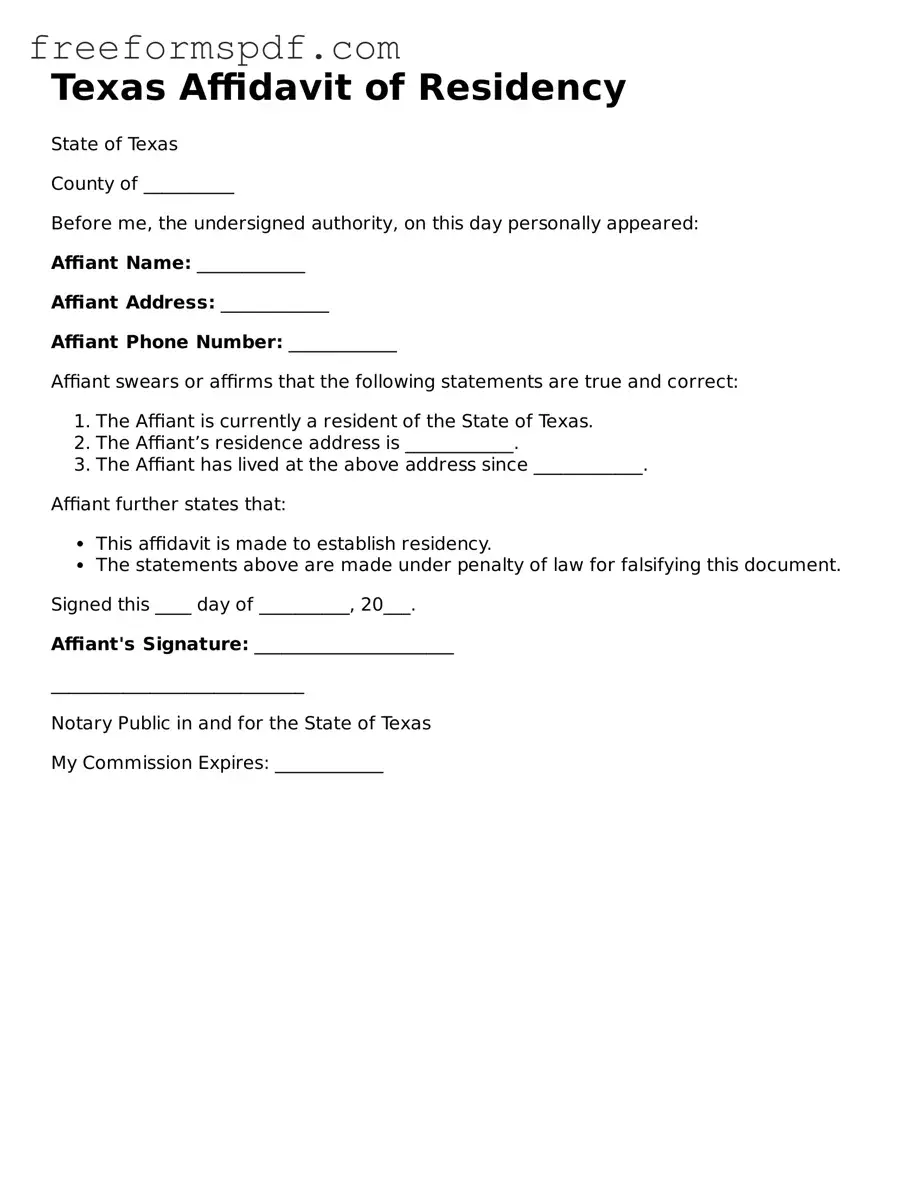Attorney-Verified Affidavit of Residency Document for Texas State
Common mistakes
-
Incomplete Information: One of the most common mistakes is failing to provide all the necessary information. When filling out the Texas Affidavit of Residency form, individuals often overlook sections that require their full name, address, and date of birth. Missing even one detail can lead to delays or rejections.
-
Incorrect Signatures: Another frequent error involves signatures. The form must be signed by the individual affirming their residency. Sometimes, people mistakenly have someone else sign on their behalf or forget to sign altogether, which invalidates the affidavit.
-
Failure to Notarize: The Texas Affidavit of Residency requires notarization. Many individuals forget this crucial step. Without a notary’s signature and seal, the affidavit is not legally binding, and it cannot be accepted by institutions that require it.
-
Using Outdated Forms: Lastly, individuals may use an outdated version of the form. It’s essential to ensure that the most current version is being used, as changes can occur over time. Using an old form could lead to complications or the need to redo the paperwork.
Learn More on This Form
-
What is the Texas Affidavit of Residency form?
The Texas Affidavit of Residency form is a legal document used to affirm an individual's residency in Texas. It is often required for various purposes, such as enrolling children in public schools or obtaining certain government services. By completing this form, individuals provide a sworn statement regarding their address and living situation.
-
Who needs to complete the Affidavit of Residency?
This form is typically required for individuals who are seeking to establish their residency in Texas. Parents or guardians may need to complete it for their children to enroll in public schools. Additionally, those applying for state benefits or services may also be asked to provide this affidavit.
-
What information is required on the form?
The form generally requires basic personal information, including the individual's name, address, and date of birth. It may also ask for details about the individual's living situation, such as how long they have resided at the given address and any relevant documentation that supports their claim of residency.
-
How is the affidavit completed and submitted?
To complete the affidavit, individuals must fill out the form accurately and truthfully. After filling it out, the form must be signed in the presence of a notary public, who will then notarize the document. Once notarized, the affidavit should be submitted to the relevant institution or agency that requested it.
-
Is there a fee associated with notarizing the affidavit?
Yes, there is typically a fee for notary services. The cost can vary depending on the notary public and the location. It is advisable to inquire about the fee beforehand to avoid any surprises.
-
What happens if the information provided is false?
Providing false information on the Affidavit of Residency can have serious consequences. Individuals may face legal repercussions, including potential charges of perjury. Additionally, any benefits or services obtained based on false information may be revoked.
-
Can the affidavit be used for multiple purposes?
Yes, the Texas Affidavit of Residency can be used for various purposes. It is commonly used for school enrollment, but it may also be required for other state services, housing applications, or any situation where proof of residency is necessary.
-
How long is the affidavit valid?
The validity of the affidavit can depend on the institution or agency requesting it. Generally, it is advisable to check with the specific entity to determine how long they will accept the affidavit as valid proof of residency.
-
Where can I obtain the Texas Affidavit of Residency form?
The form can typically be obtained from various sources, including school district offices, state agency websites, or legal assistance organizations. It is important to ensure that you are using the most current version of the form.
-
What if I have more questions about the affidavit?
If you have additional questions, it is recommended to contact the institution or agency that requires the affidavit. They can provide specific guidance and clarify any uncertainties regarding the process.
Misconceptions
The Texas Affidavit of Residency form is often misunderstood. Below are six common misconceptions about this form, along with clarifications.
- It is only for students. Many believe that the Affidavit of Residency is exclusively for students. In reality, it can be used by anyone needing to establish residency in Texas for various purposes, including voting and obtaining a driver’s license.
- It must be notarized. Some people think that notarization is mandatory for the Affidavit of Residency. However, while notarization is often recommended, it is not a strict requirement for all situations.
- Only property owners can complete it. A common misconception is that only homeowners can fill out this form. Renters can also complete the affidavit, provided they meet the residency requirements.
- It is a permanent document. Many assume that once the affidavit is submitted, it remains valid indefinitely. In fact, residency can change, and individuals may need to update their affidavit if their living situation changes.
- It guarantees residency status. Some individuals think that submitting the affidavit automatically confirms their residency status. However, the form serves as a declaration and may require additional documentation to support residency claims.
- It is only accepted in certain counties. There is a belief that the Affidavit of Residency is limited to specific counties in Texas. In truth, this form is recognized statewide, although local offices may have their own submission guidelines.
